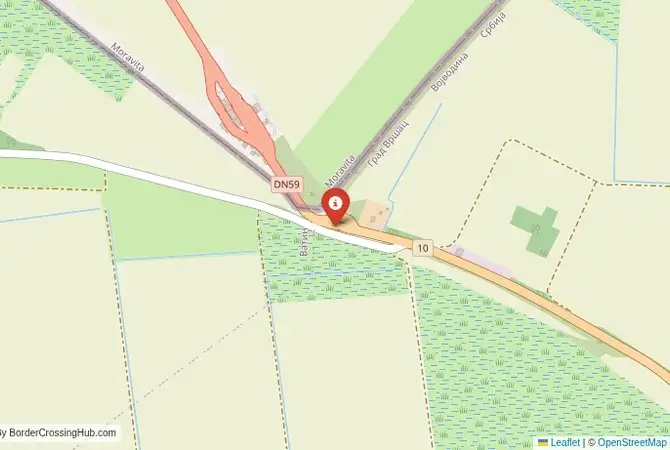
Approximate Border Location
Wait Times
15-60 min for pedestrians/vehicles
Operating Hours
Open 6:00 AM – 8:00 PM
Crossing Types
Pedestrians, vehicles
Border Type
Land crossing via road
Peak Times
Mornings (7-10 AM)
Daily Crossings
~1000 travelers/vehicles
Currency Exchange
Limited near Vatin (RON, RSD)
Safety Information
Remote, rural hazards
Languages Spoken
Romanian/Serbian
Accessibility Features
Ramps, limited assistance
About Vatin & Vatin
The Main Artery
The border crossing connecting Stamora Moravița in Romania with Vatin in Serbia is one of the primary arteries for travel between the two countries. This is a major, 24/7 international checkpoint for both road and rail, a workhorse of a border designed for high-volume traffic. It is the main southern land route linking the major Romanian city of Timișoara with the Serbian capital, Belgrade. Its character is defined by its functionality and its crucial role in the economic and social life of the region. This is not a scenic detour; it is the most practical and heavily used crossing point in the Banat region, a vital conduit for commerce, tourism, and commuters.
Operational Details
This checkpoint connects Romania’s Timiș County with Serbia’s South Banat District. Its round-the-clock operation and its capacity to handle all forms of traffic, from passenger cars to the heaviest freight trucks, make it the most reliable and logical choice for most travelers. The parallel railway line underscores its long-standing importance as a strategic corridor, a role it has fulfilled for well over a century, facilitating the movement of goods and people between these two key Balkan cities.
Before Crossing
Crossing borders gets messy sometimes, think political flare-ups or gates shutting fast. Good travel insurance is a must for handling doctor visits, trip disruptions, or security scares. Don’t get caught unprepared. To find a policy that’s got your back, check out reliable plans today for peace of mind.
Historical Context
The history of this route is intertwined with the development of the Banat region. After the Habsburg conquest of the area, Timișoara was developed into a major administrative and military center. The connection to Belgrade has always been important. The infrastructure you see today is the modern incarnation of centuries of trade and travel along this path. The border itself, established after World War I, divided the historic Banat region, but the economic and cultural pull between Timișoara and the Serbian Banat has remained strong. This crossing is the most tangible expression of that enduring connection.
Border Crossing Procedure
The border crossing procedure is well-established and designed to handle a significant and constant flow of traffic. As Serbia is not an EU member state, you will undergo full customs and immigration checks. The checkpoint is a large complex with separate facilities on each side of the border line. You will first complete exit formalities with the Romanian Poliția de Frontieră at Stamora Moravița. After driving through a short neutral zone, you will arrive at the Serbian checkpoint at Vatin for their entry inspection by border police and customs. The process requires a valid passport for all travelers, as well as vehicle registration and international insurance (Green Card). The checkpoint has multiple lanes to separate passenger cars from the long lines of freight trucks, which is essential for keeping traffic moving. However, this is the busiest crossing in the area, and you should be prepared for potential queues, especially during the summer holiday season and on weekends. Checking a live traffic application before you arrive is a highly recommended strategy to anticipate potential delays.
Regional Attractions
The surrounding region offers significant attractions. On the Romanian side, Timișoara is a major destination. Known as “Little Vienna,” the city boasts a stunning collection of Baroque, Neoclassical, and Secessionist architecture, particularly around its three main squares: Victory Square, Liberty Square, and Union Square. It holds the distinction of being the first city in mainland Europe to have electric street lighting and was the cradle of the 1989 Revolution that toppled the communist regime. On the Serbian side, a short drive from the border is the town of Vršac, the center of one of Serbia’s most important wine-growing regions. The town is picturesquely set at the foot of the Vršac Mountains, and a visit to one of the local wine cellars is a popular activity. The road from the border leads directly towards the Serbian capital, Belgrade.
Practical Travel Information
Practical planning is key for this route. The crossing is on the main E70 European route. You will need to purchase the Romanian `rovinietă` vignette for your vehicle, which can be done online. Serbia uses a toll system for its main motorways, and you will encounter toll plazas on the route towards Belgrade. The official currencies are the Romanian Leu (RON) and the Serbian Dinar (RSD). Numerous 24/hour petrol stations and currency exchange offices are available on both sides of the border, particularly in the larger towns.
Final Considerations
The Stamora Moravița–Vatin crossing is the pragmatic choice for travel between western Romania and Serbia. It is a busy, efficient, and vital piece of infrastructure. While it may lack the unique charm or scenic beauty of smaller, more specialized crossings, its value lies in its reliability and its direct connection between two major economic and cultural centers. It is a border that works hard, day and night, to facilitate the connections that define the modern relationship between Romania and Serbia. For most travelers, its functionality is precisely what makes it the best option.
No reviews yet.
